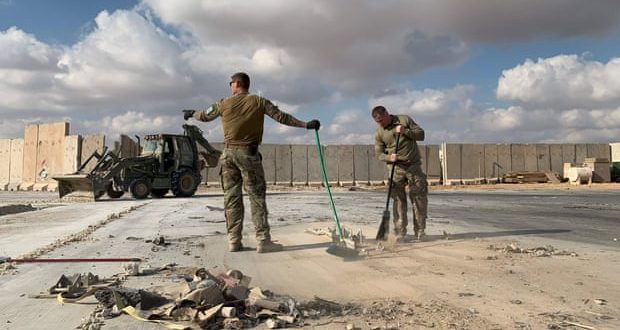The number of US service members diagnosed with traumatic brain injury (TBI) stemming from Iran’s missile attack on a base in Iraq last month has shot up to more than 100, the Pentagon said Monday.
The department said 109 military members had been treated for mild TBI, a significant increase over the 64 reported a little over a week ago.
The number of injuries has been steadily increasing since the Pentagon began releasing data on the injuries about a week after the 8 January attack at al-Asad airbase in Iraq.
Pentagon officials have warned that the number will continue to change.
The department said 76 of the service members have returned to duty, while 26 are in Germany or the United States for treatment, and another seven are on their way from Iraq to Germany for evaluation and treatment.
Donald Trump had previously said that the US “suffered no casualties” from the attack, which was a reprisal for the US drone strike assassination of the Iranian Gen Qassem Suleimani.
Questioned later about reports of brain injury, Trump downplayed their severity: “I heard that they had headaches. And a couple of other things. But I would say, and I can report, it is not very serious.”
Speaking after Trump’s remarks, Michael Kaplen, the chair of the New York State Traumatic Brain Injury Services Coordinating Council and past president of the Brain Injury Association of New York State, said that the condition is a “life-altering” injury.
“It’s physical, cognitive, emotional and behavioral consequences affect every aspect of an individual’s life,” he said. “A brain injury is only ‘mild’ if it is someone else’s brain. There is nothing ‘mild’ about a mild brain injury.”
The Army general Mark Milley, the chair of the Joint Chiefs of Staff, said last month that the service members suffering from traumatic brain injuries had been diagnosed with mild cases. He added the diagnosis could change as time went on.
Pentagon officials have repeatedly said there has been no effort to minimize or delay information on concussive injuries. But the disclosures following Tehran’s attack have renewed questions over the US military’s policy regarding how it internally reports suspected brain injuries and whether they are treated publicly with the same urgency as loss of limb or life.
The Guardian
 Lebanese Ministry of Information
Lebanese Ministry of Information



